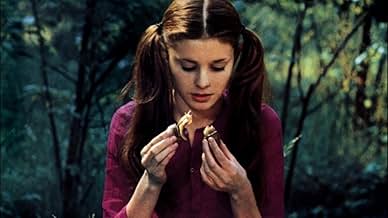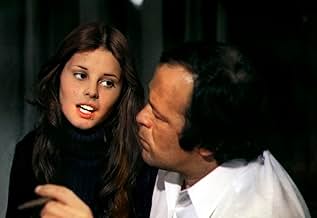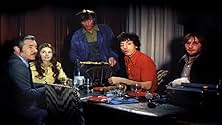Adicionar um enredo no seu idiomaA married couple purchases an abandoned house in the countryside. Soon they witness strange apparitions and events. Their son and their prepubescent daughter are haunted by a poltergeist.A married couple purchases an abandoned house in the countryside. Soon they witness strange apparitions and events. Their son and their prepubescent daughter are haunted by a poltergeist.A married couple purchases an abandoned house in the countryside. Soon they witness strange apparitions and events. Their son and their prepubescent daughter are haunted by a poltergeist.
- Prêmios
- 1 vitória e 1 indicação
- Direção
- Roteiristas
- Elenco e equipe completos
- Produção, bilheteria e muito mais no IMDbPro
Enredo
Você sabia?
- CuriosidadesMimi Young's debut.
- Trilhas sonorasConcerto #4
Written par Vieux-Temps
Performed by Arthur Grumiaux, violin
Avaliação em destaque
With a runtime that's fairly typical for a genre flick, it's noteworthy that there are no specific goings-on until fifteen minutes in. A few minutes later and still most of what we've seen has been varying levels of disquiet or tension, or possibly the sudden depiction of an occurrence so trivial that one almost has to suppress laughter. On the other hand, the bigger effects sequences that start to kick up actually look really great, and are duly jarring, and there are moments of some delicious, creepy subtlety, too. All this is to say that at the same time that 'Au rendez-vous de la mort joyeuse,' or 'At the meeting with joyous death' (also known as 'Expulsion of the devil') doesn't necessarily come off as anything special, it's also perhaps a little bit of a mixed bag. Still, countless other horror films have gone far more wrong much more quickly, and this really does demonstrate moderate but admirable strength. I don't think it's anything one needs to go out of their way to see, but this is ultimately a pretty good time, and worth checking out if one has the chance to watch.
Plenty of other stories have been told about haunted houses, poltergeists, and other supernatural events, not least in cinema stretching all the way back to its earliest years. Be that as it may, as the tale progresses here the first point of comparison I drummed up was Tobe Hooper's 1982 classic 'Poltergeist'; this is hardly to say that direct lines can be drawn, but the two titles are of a kindred spirit. This includes, in some measurable quantity, the chilling atmosphere that 'La mort joyeuse' is able to achieve at its best. Some of the practical effects are stark and vivid in a way that's also gratifyingly familiar, and though the sound design is arguably a little rough around the edges, the picture makes smart use of sound effects. (Even fifty years later, the same can't be said of all like-minded features.) Between Juan Luis Buñuel's practiced direction and some shrewd cinematography from Ghislain Cloquet, some particular shots are especially well done; even some moments that are somewhat mundane, or border on Movie Magic, are lent unexpected power by the manner in which they're depicted, or allowed to play out.
And that kind of goes for the movie at large: the proceedings oscillate in terms of how much suspension of disbelief they require, yet when all is said and done Buñuel illustrates plentifully sufficient skill and intelligence to allow this to succeed much more than not; I'm actually pleasantly surprised by how good it is. Sure, no one was reinventing the wheel here, neither Buñuel, co-writer Pierre-Jean Maintigneux, nor anyone else. Even if the value is variable, however, there's more of it than can be said for a lot of other genre pieces. In light of all those facets I've mentioned this is definitely thanks in no small part to the crew operating behind the scenes, also including excellent production design and lighting, among other things. The cast is also surely to be commended, though, for able performances of strong emotion that help to realize the unnerving energy and terrific vitality that this boasts when it's firing on all cylinders. Even in only a small supporting part Francoise Fabian commands noteworthy presence; Jean-Pierre Darras makes more of an impression than one would assume at first. Other supporting cast members, some of whom may not even portray a character that gets named on-screen, appreciably play their part in bringing the tableau to life. And more than anyone else, I really have to hand it to Yasmine Dahm. Her career as an actor may have been limited, but she illustrates delightful nuance and personality as Sophie that's a crucial component of the viewing experience.
In addition to a relatively weak start, the ending is curiously low-key; the pressure builds and builds, and in the last few minutes the heat is just turned off. I don't think the ending is bad, but it lacks a spark of vibrancy to make it count - and just as much to the point, while some notions are discretely hinted at throughout the length in terms of a "bigger picture" underlying the course of events, none of these are brought to fruition. The mystery of the house remains a mystery, which is a somewhat novel and interesting approach to take, but not one that completely satisfies. Some instances of dialogue raise a bit of an eyebrow; though rare, in some scenes it feels ever so slightly like the plot is being forced along unnaturally, like squeezing a puzzle piece into a space that's the right shape but not quite the right size. All of these are unfortunate factors that limit the best potential of the feature, and keep it from finding greater favor. This is unfortunate, surely, because I'm pleased to say that there really is a lot to like about 'Au rendez-vous de la mort joyeuse,' and as a lesser known horror film it's certainly better than too many others. Everyone involved turned in fine work, and more than anything I think if the screenplay were fine-tuned then the end result could have been more impactful - more dread ambience, visceral responses that were both more meaningful and more numerable, a viewing experience that's broadly more rewarding. Still, while the end result isn't wholly essential, and not without its shortcomings, I'd be lying if I said I weren't entertained. It's not a must-see, but this 1973 French flick provides a spooky good time, and that's more than enough to earn a fair recommendation.
Plenty of other stories have been told about haunted houses, poltergeists, and other supernatural events, not least in cinema stretching all the way back to its earliest years. Be that as it may, as the tale progresses here the first point of comparison I drummed up was Tobe Hooper's 1982 classic 'Poltergeist'; this is hardly to say that direct lines can be drawn, but the two titles are of a kindred spirit. This includes, in some measurable quantity, the chilling atmosphere that 'La mort joyeuse' is able to achieve at its best. Some of the practical effects are stark and vivid in a way that's also gratifyingly familiar, and though the sound design is arguably a little rough around the edges, the picture makes smart use of sound effects. (Even fifty years later, the same can't be said of all like-minded features.) Between Juan Luis Buñuel's practiced direction and some shrewd cinematography from Ghislain Cloquet, some particular shots are especially well done; even some moments that are somewhat mundane, or border on Movie Magic, are lent unexpected power by the manner in which they're depicted, or allowed to play out.
And that kind of goes for the movie at large: the proceedings oscillate in terms of how much suspension of disbelief they require, yet when all is said and done Buñuel illustrates plentifully sufficient skill and intelligence to allow this to succeed much more than not; I'm actually pleasantly surprised by how good it is. Sure, no one was reinventing the wheel here, neither Buñuel, co-writer Pierre-Jean Maintigneux, nor anyone else. Even if the value is variable, however, there's more of it than can be said for a lot of other genre pieces. In light of all those facets I've mentioned this is definitely thanks in no small part to the crew operating behind the scenes, also including excellent production design and lighting, among other things. The cast is also surely to be commended, though, for able performances of strong emotion that help to realize the unnerving energy and terrific vitality that this boasts when it's firing on all cylinders. Even in only a small supporting part Francoise Fabian commands noteworthy presence; Jean-Pierre Darras makes more of an impression than one would assume at first. Other supporting cast members, some of whom may not even portray a character that gets named on-screen, appreciably play their part in bringing the tableau to life. And more than anyone else, I really have to hand it to Yasmine Dahm. Her career as an actor may have been limited, but she illustrates delightful nuance and personality as Sophie that's a crucial component of the viewing experience.
In addition to a relatively weak start, the ending is curiously low-key; the pressure builds and builds, and in the last few minutes the heat is just turned off. I don't think the ending is bad, but it lacks a spark of vibrancy to make it count - and just as much to the point, while some notions are discretely hinted at throughout the length in terms of a "bigger picture" underlying the course of events, none of these are brought to fruition. The mystery of the house remains a mystery, which is a somewhat novel and interesting approach to take, but not one that completely satisfies. Some instances of dialogue raise a bit of an eyebrow; though rare, in some scenes it feels ever so slightly like the plot is being forced along unnaturally, like squeezing a puzzle piece into a space that's the right shape but not quite the right size. All of these are unfortunate factors that limit the best potential of the feature, and keep it from finding greater favor. This is unfortunate, surely, because I'm pleased to say that there really is a lot to like about 'Au rendez-vous de la mort joyeuse,' and as a lesser known horror film it's certainly better than too many others. Everyone involved turned in fine work, and more than anything I think if the screenplay were fine-tuned then the end result could have been more impactful - more dread ambience, visceral responses that were both more meaningful and more numerable, a viewing experience that's broadly more rewarding. Still, while the end result isn't wholly essential, and not without its shortcomings, I'd be lying if I said I weren't entertained. It's not a must-see, but this 1973 French flick provides a spooky good time, and that's more than enough to earn a fair recommendation.
- I_Ailurophile
- 5 de jul. de 2023
- Link permanente
Principais escolhas
Faça login para avaliar e ver a lista de recomendações personalizadas
- How long is Expulsion of the Devil?Fornecido pela Alexa
Detalhes
- Tempo de duração1 hora 30 minutos
- Mixagem de som
Contribua para esta página
Sugerir uma alteração ou adicionar conteúdo ausente

Principal brecha
By what name was Au rendez-vous de la mort joyeuse (1973) officially released in India in English?
Responda























